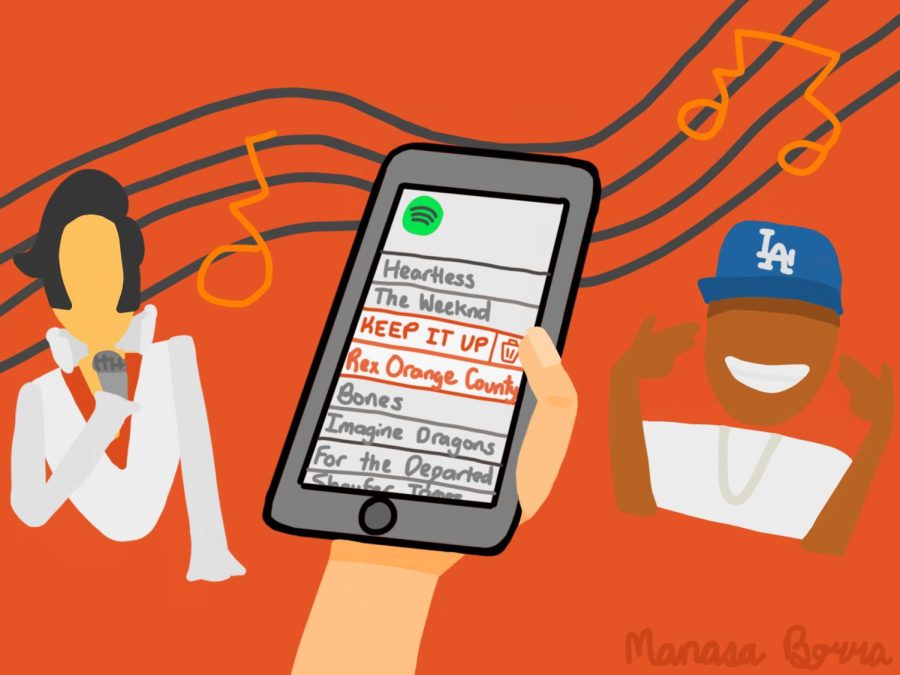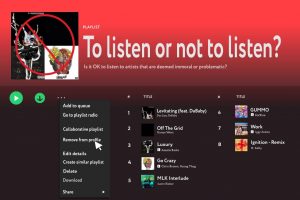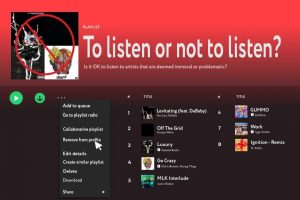Art can’t be separated from the artist
A thought-provoking question that commonly comes up when discussing problematic musicians is if art can be separated from the artist. The Sidekick staff photographer Kayla Nguyen believes that art cannot be separated from the artist, and listeners should be conscious of their music choices.
October 26, 2022
I love a formulaic day. I find immense comfort in the ritualistic nature of an academic week and I always look forward to my after-school routine:
- Fill a water cup with half cubed and half crushed ice.
- Sit on the wobbly stool at my kitchen counter.
- Grab my phone and scroll through TikTok.
It was a Monday like any other on Oct. 10, when I felt the overwhelming urge to pick up my phone after a long and tiring day of sophomore year. Muscle-memory took over, and with a couple swipes and the click of a button I was transported to the realm that would occupy my brain for the next 15 minutes: my TikTok “For You” page. I scrolled past a clip of a cat meowing in a low purr and a video of a devoted ‘Swiftie’ analyzing the lyrics of Taylor Swift’s “seven” before I came across news that would thoroughly rattle me for the rest of the day:
The well-known musician Alexander James O’Connor, more commonly known by the stage name Rex Orange County, was charged with six counts of sexual assault.
My first reaction to this news was pure shock, but that didn’t last long before it quickly turned into unadulterated rage. Rage over the fact that the artist behind heartbreaking ballads summing up the most complex human emotions could commit a crime like this. Rage that this happened yet again to another innocent girl. Rage that this wouldn’t be the last time.
After the initial adrenaline rush, I proceeded to fall down a rabbit hole to see what more I could learn about the situation. In the midst of fellow maddened fans and outlandish conspiracy theories, a phrase kept on popping up: “Separate the art from the artist.”
This expression struck a chord with me as I began to ponder the depth of its meaning.
Is it immoral to consume the product of a ‘problematic’ creator?
Is cancel culture warranted when it comes to an artist that is publicly sexist, racist, homophobic, ableist or antisemetic?
Does one contemptible action justify the boycotting of an influential person?
Though something like streaming a song by a controversial artist may seem small, it still can support their career and, as a result, provide them with a larger platform with which they can spread a hateful message. Especially when something as serious as sexual assault is considered, continuing to abide by an abhorrent musician adversely affects victims everywhere. It pushes the narrative that their voice will go unheard, and what they are going through is insignificant.
One’s words and actions will always have implications,and musicians and influential figures have to be cognizant of the fact that what they put out will always be associated with them.
Though, this belief aligns with my own, and others may hold artists to differing levels of responsibility. The idea of separating the art from the artist is admittedly difficult to standardize.
Music has the supernatural ability to pull at heartstrings and stir emotions that no material objects can muster. When a song deeply resonates with us, its sentimental value can never truly fade. It is understandable, then, how some people maintain that continuing to consume music by problematic artists is justified.
Nevertheless, the support of artists’ music is undeniably correlated to the support of their actions, simply because listening to their music directly benefits them. There isn’t a rulebook that states “three strikes, then you’re out,” but there is a reasonable threshold of morality that public figures must abide by. Ultimately, we as listeners must be conscientious of the repercussions that may come from the music we choose to consume.
Ironically, Rex Orange County was right in one way: once an inexcusable truth is revealed about an artist, “It’s Not The Same Anymore.”
Follow Kayla (@kaylagnguyen) and @CHSCampusNews on Twitter












Shrayes Gunna • Oct 29, 2022 at 12:30 am
Such a fun read Kayla! And may I add that “seven” is my favorite Taylor Swift song